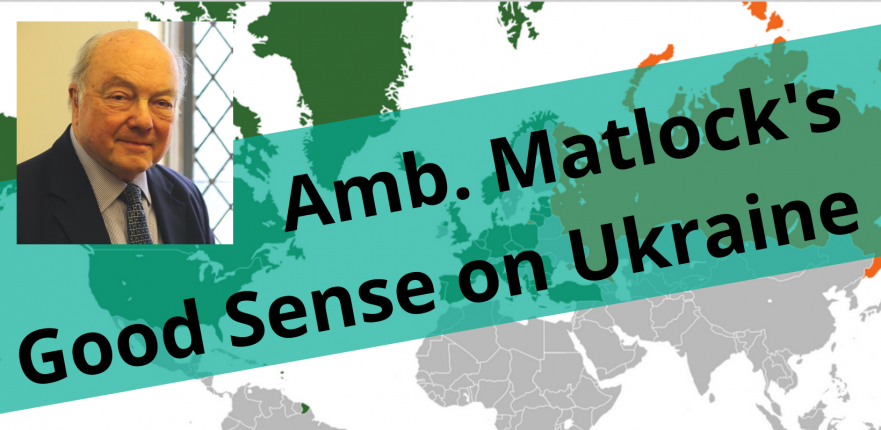Amb. Jack Matlock Jr. was Ambassador to Moscow for the two U.S. Presidents who, between them, brought the extremely perilous, decades-long Cold War between the United States and the Soviet Union to a surprisingly peaceable conclusion: Presidents Ronald Reagan and George H.W. Bush.
Today, he has published a carefully documented essay in which he argues that the present crisis between Washington and Moscow over the issue of Ukraine is: “an avoidable crisis that was predictable, actually predicted, willfully precipitated, but easily resolved by the application of common sense.”
I’ll provide some key excerpts from Amb. Matlock’s piece below. Here, I’d just like to urge readers also to check out the recent, very deeply informed and sensible writings on Ukraine of Anatol Lieven (at Responsible Statecraft) and Melvin Goodman (at Counterpunch).
In Amb. Matlock’s essay, he writes:
the decision to expand NATO piecemeal was a reversal of American policies that produced the end of the Cold War and the liberation of Eastern Europe. President George H.W. Bush had proclaimed a goal of a “Europe whole and free.” Soviet President Gorbachev had spoken of “our common European home,” had welcomed representatives of East European governments who threw off their Communist rulers and had ordered radical reductions in Soviet military forces by explaining that for one country to be secure, there must be security for all.
He also recalls that,
The first President Bush also assured Gorbachev during their meeting on Malta in December, 1989, that if the countries of Eastern Europe were allowed to choose their future orientation by democratic processes, the United States would not “take advantage” of that process. (Obviously, bringing countries into NATO that were then in the Warsaw Pact would be “taking advantage.”) The following year, Gorbachev was assured, though not in a formal treaty, that if a unified Germany was allowed to remain in NATO, there would be no movement of NATO jurisdiction to the east, “not one inch.”
He notes that the process of adding East European countries to NATO began under Pres. Bill Clinton and then continued under Pres. George W. Bush. Additionally, under George W. Bush,
the United States began withdrawing from the arms control treaties that had tempered, for a time, an irrational and dangerous arms race and were the foundation agreements for ending the Cold War. The most significant was the decision to withdraw from the Anti-Ballistic Missile Treaty (ABM Treaty) which had been the cornerstone treaty for the series of agreements that halted for a time the nuclear arms race.
As for Pres. Barack Obama, Matlock wrote that,
his government continued to ignore the most serious Russian concerns and redoubled earlier American efforts to detach former Soviet republics from Russian influence and, indeed, to encourage “regime change” in Russia itself. American actions in Syria and Ukraine were seen by the Russian president, and most Russians, as indirect attacks on them.
… So far as Ukraine is concerned, U.S. intrusion into its domestic politics was deep—to the point of seeming to select a prime minister. It also, in effect, supported an illegal coup d’etat that changed the Ukrainian government in 2014, a procedure not normally considered consistent with the rule of law or democratic governance. The violence that still simmers in Ukraine started in the “pro-Western” west, not in the Donbas where it was a reaction to what was viewed as the threat of violence against Ukrainians who are ethnic Russian.
During President Obama’s second term, his rhetoric became more personal, joining a rising chorus in the American and British media vilifying the Russian president.
At the end of his essay, Matlock asks rhetorically whether the present crisis can be easily resolved by the application of common sense. His answer?
The short answer is because it can be. What President Putin is demanding, an end to NATO expansion and creation of a security structure in Europe that insures Russia’s security along with that of others is eminently reasonable. He is not demanding the exit of any NATO member and he is threatening none. By any pragmatic, common sense standard it is in the interest of the United States to promote peace, not conflict. To try to detach Ukraine from Russian influence—the avowed aim of those who agitated for the “color revolutions”—was a fool’s errand, and a dangerous one. Have we so soon forgotten the lesson of the Cuban Missile Crisis?
The ambassador also posits, near the beginning of the essay, the suggestion that Pres. Biden’s actively escalatory policy on Ukraine may be part of a carefully staged “wag the dog” type scenario in which he seeks to divert attention from his many political failures at home.
I have also entertained that thought over recent weeks. Another possible explanation for Biden’s warmongering (and these are not mutually exclusive) may be, in my view, a kind of toxic masculinity that has persuaded him to beat his breast and strut menacingly on the world stage as a way to “restore American credibility” after what many domestic opponents describe as a serious American “humiliation” in Afghanistan.
Well, whatever the explanation, the urgent need now is to de-escalate these very serious tensions between very heavily nuclear-armed powers, and engage in the kind of real diplomacy that will remove the need for any party to go to war.
I just hope against hope that it is not too late for this and that Biden has not ended up talking himself and Pres. Putin into a situation where neither feels he can back down.

